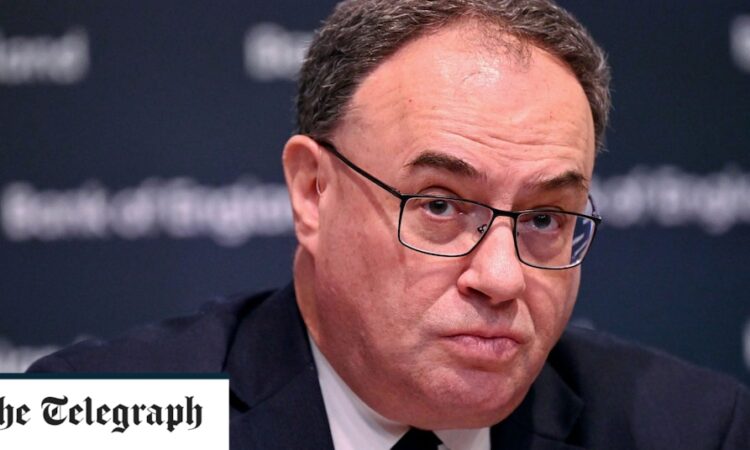
Lenders began putting up variable rate mortgage costs to reflect the rise, with Barclays raising the rate on two of its products. There are 715,000 borrowers on tracker mortgages and 895,000 on variable rate deals, altogether accounting for a fifth of the residential mortgage market, according to UK Finance, the lender body.
These deals all fluctuate in line with the Bank Rate, which means that borrowers’ mortgage costs will go up quickly.
The difference of opinion between central banks speaks to the challenge facing the institutions as they attempt to get inflation down without making the coming recession worse.
Mr Bailey said: “We think we’ve seen possibly this week the first glimmer, with the figures released this week, that it’s not only beginning to come down but it is a little bit below where we thought it would be and that is obviously very good news.”
The consumer price index measure of inflation dropped to 10.7pc last month, according to official figures released earlier this week.
There was a three-way split on the Bank’s Monetary Policy Committee (MPC) over how to respond, with two rate setters – Silvana Tenreyro and Swati Dhingra – voting to pause tightening. A third, Catherine Mann, backed a larger increase in rates
The Bank signalled that rates will still have to go higher, although the language used was more cautious than in the US or eurozone.
Mr Bailey said: “We expect inflation to start falling more rapidly probably from the late spring onwards.
“But there is a risk that it won’t happen in that way, particularly because the labour market and the labour supply in this country is so tight. That is why we had to raise interest rates today because we see that risk as really quite pronounced.”
Markets expect the Bank to boost rates to a peak of 4.5pc, further than the rate-setters have signalled, in a sign they doubt Mr Bailey’s ability to keep inflation under control. Last year the Bank mistakenly described the surge in prices as a “transitory” phenomenon.
City economists said the Bank was signalling that an end to its rate hikes could be close.
Sanjay Raja, Deutsche Bank’s chief UK economist, said: “With two members voting to pause on the hiking cycle, it’s clear that the overall appetite for further monetary policy tightening is starting to wane amongst the committee.”
Samuel Tombs, chief UK economist at Pantheon Macroeconomics, said the MPC is closer to the end of its rate hiking cycle following the meeting.
He said: “The vote split was more dovish than expected, and the guidance on further hikes was very wishy-washy.”
The MPC delivered a slightly brighter outlook for the economy but still warned that Britain is heading into a prolonged recession as households are battered by the highest inflation in four decades.
It said that the Chancellor Jeremy Hunt’s Autumn Statement measures, including the extension of energy support for households, would boost GDP by 0.4pc over the next year and lower its inflation forecast by 0.75 percentage points by mid 2022.
The Bank predicted that GDP will fall 0.1pc in the final three months of 2022, better than the 0.3pc drop it expected in November, while the third quarter was also better than feared.
The Bank has moderated the pace of interest rate rises in the same week as the Fed, which increased rates by 0.5 points on Wednesday.
However, rate rises up until now have been much more aggressive in the US than the UK. The Fed’s chairman, Jerome Powell, also insisted that there was “more work to do” in the months ahead.
The ECB also slowed the pace of its borrowing cost increases but markets were shaken by promises of more tough action.
It raised its deposit rate by 0.5 percentage points to 2pc but more than a third of the ECB’s Governor Council wanted to be tougher.
Ms Lagarde insisted that the ECB is not “pivoting” and said it will boost rates at its current pace for “a period of time”
Claus Vistesen, economist at Pantheon Macro, said the ECB had lifted the outlook for the peak for interest rates up “sharply”.
“The statement from the ECB was the most hawkish we’ve ever covered, by a substantial margin.”
Jörg Krämer, economist at Commerzbank, said: “The ECB has shown itself to be much more determined than before and is now holding out the prospect of ‘significant’ rate hikes.”
Division grows on the MPC over when to stop rate rises
Andrew Bailey has picked up a few battle scars this year. He has fought turmoil in the bond markets, a government push to overrule the Bank on regulation, and accusations that Threadneedle Street has been behind the curve in tackling inflation.
Now, members within his own ranks are suggesting he may have gone too far in reining in price growth as recession looms.
City economists highlighted an unusually large spread of opinion in the divided nine-strong Monetary Policy Committee on Thursday as the Bank boosted interest rates by a further 0.5 percentage points to 3.5pc, the highest level since 2008.
Opinions on the MPC range from those who believe the Bank needs to stop increasing borrowing costs for households and businesses immediately, to one rate-setter who thinks Bailey and Co. are letting up too soon.
In the end, Bailey managed to get five other rate-setters – including his three deputy governors – onside to vote for a slowing from the 0.5 percentage point increase in Bank rate to 3.5pc on Thursday. It marks a slowing from the bumper 0.75 percentage point boost in November but that is little comfort after the biggest yearly increase in borrowing costs since 1988.
Where interest rates – and Britain’s mortgage misery – end up peaking in 2023 is still up in the air.






